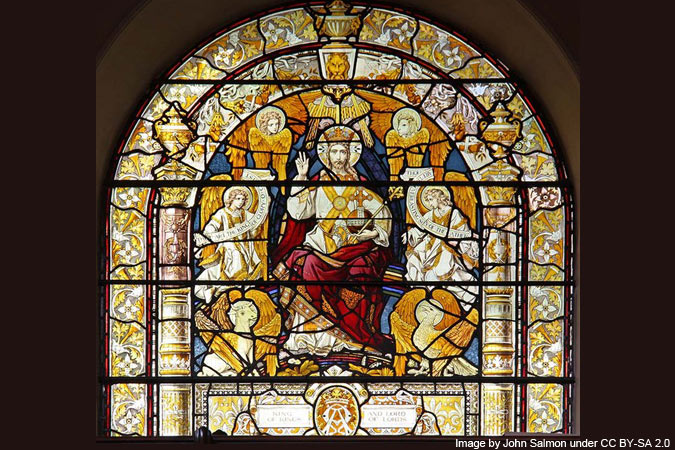
In just a few short days, the Church celebrates the Feast of Christ the King, officially known as the Solemnity of Our Lord Jesus Christ, King of the Universe. This celebration is the culmination of the Church’s liturgical year—a glorious celebration of the Lord who reigns in our lives. And yet, I rarely hear a good homily about the notion of Christ the King. I’ve actually heard homilists dismiss the theme of the feast because royalty is no longer a part of our experience in the U.S. or because the image of a king is too male. Well, sheep and shepherds are no longer a part of our experience in the U.S., but we have no problem thinking of Jesus as the Good Shepherd and, while a king is male, it is not maleness that we celebrate on this feast but the qualities of one who reigns benevolently.
In my book, Under the Influence of Jesus: The Transforming Experience of Encountering Christ, I share the following thoughts about kingship:
In their book, King, Warrior, Magician, Lover, authors Douglas Gillette and Robert Moore help us to see how priceless a true king is. According to Moore and Gillette, the archetypal king:
-
is centered and centering. The king is the geographic and spiritual center of his realm, bringing order in the midst of chaos. His role is to unify.
-
is decisive. The king represents firm and unchanging principles, and his decisions flow from these principles and are in the best interests of his people.
-
lives with integrity. His role is to embody integrity and virtue and to consistently use these qualities to mend relationships, represent truth, and keep his word.
-
protects the realm. The king safeguards his realm from danger and threats. This includes providing for the needs of the poor and vulnerable.
-
provides order. The king represents and enforces the law to establish order and to ensure that fairness and justice reign.
-
creates and inspires creativity in others. The king uses his influence to empower others to achieve their full potential.
-
blesses the lives of others. The king recognizes and honors others for their achievements and extends his favor to them.
-
leaves a legacy. The king leaves behind a gift to remind future generations of his enduring greatness.
Benevolent kings of the past who lived up to these responsibilities were hailed by their subjects, who eagerly and loyally identified with them. For us to celebrate Christ as our King is to proclaim that God has intervened in our lives to:
- bring order to our lives;
- unify his people;
- do what is best for us;
- mend relationships;
- convey the truth;
- fulfill his word;
- protect us from the danger of sin;
- provide for order and justice;
- inspire us to live to our full potential;
- affirm us; and
- be with us forever.
To proclaim Christ as our King is to hail him, follow him, and identify with him. He is ours, and we are his. When Jesus taught us to pray “thy kingdom come,” he taught us to invite a king who has our best interests in mind to plant his flag in the center of our lives and to do what he does best for our benefit and the benefit of others. To pray the Our Father is to declare that, at our deepest level, we are incapable of sustaining ourselves and therefore happily rely on God, our King, to provide for our well-being.
Several years ago, I taught a sixth-grade lesson on the role of the king and included this handout (Symbols of Royalty), which you might enjoy using with your students. Happy Feast of Christ the King!
Image by John Salmon under CC BY-SA 2.0.




Here are the answers to the pdf (symbols of royalty) – 1.J; 22D; 3.A; 4.I; 5.H; 6.B; 7.G; 8.E; 9.F; 10.C
Thank you! How did you get the answers?
Hi Elena. Here is the answer key: 1.A; 2.E; 3.D; 4.I; 5.H; 6.B; 7.G; 8.C; 9.J; 10.F
Thank you. I notice that there are two answer keys.